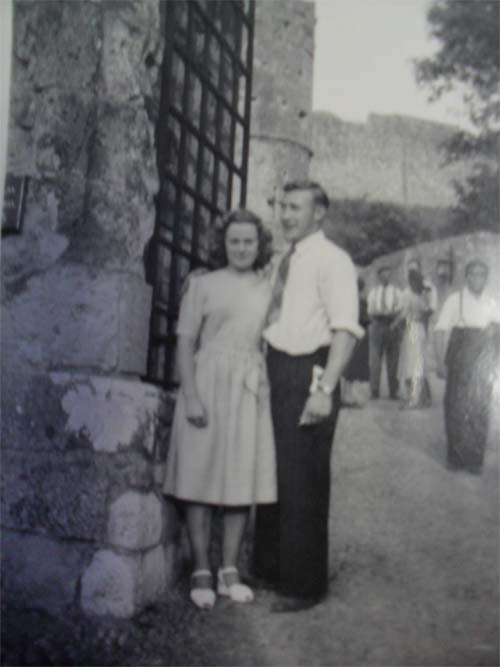
Maureen, a wire girl, and her boyfriend on the Isle of Wight.
Young women workers public house attendance during the war and attitudes towards it highlights variety in opinions. They reveal both continuity and change regarding young woman’s place in the public sphere and how young women should behave. Oral testimonies reflect similar responses that generally it was becoming more acceptable for women to drink in pubs; however, not on their own; and conventional family based attitudes about pubs being ostensibly a male space were still apparent.
Pub going can be seen as evidence of the transformative effect of the war on women’s self-perceptions and opportunities.[1] Claire Langhamer’s findings have led her to suggest that wartime meanings attached to pub attendance were arguably overturned as a masculine space during the war. This indicates that women were challenging gender stereotypes and remaking what was seen as socially acceptable for women to suit their own lifestyles for example, for courtship[2].
Gwenda, a Portsmouth dockyard worker, did not like pubs. She felt that “women didn’t go in pubs on their own, no way!” It is likely that this opinion developed from her mother’s disapproval of women drinking in pubs. She thought women should be at home getting the dinner ready.[3] This reveals that urban wartime attitudes were not as liberal as perhaps Langhamer suggests.[4] Dorothy, a barmaid in her family’s pub, The Jolly Sailor, presents a contrasting view of Portsmouth women’s public house attendance; “I don’t think women were afraid to go into pubs on their own in those days”. In particular Dorothy suggests women who were in the services had no problem about going into pubs, regarding her family’s pub “Oh yeah they came in they had no inhibitions did they? [laughs]”.[5]
Varied opinions suggest that attitudes within Portsmouth loosened regarding women drinking in pubs. However, what remains clear is that young women would not go into pubs on their own and despite freedom and independence from family control; their families’ attitudes still dictated how young women conducted themselves within public houses. Therefore, young women’s movement and freedom within the wartime port town into public houses was conducted with some caution and reflects the gendered work place culture extended into the social lives of women workers.
References
[1] Mass Observation reveals that attitudes towards women drinking were softening, one woman said pubs are for all classes and sexes and one sixty five year old publican said women have just as much rights as men to drink. Cited within Claire Langhamer, “A public house is for all classes, men and women alike’: women, leisure and drink in Second World War England,” Women’s History Review 12, no. 3 (2003), 434. Source, M-O A: FR1611, pp. 1-2.
[2] Claire Langhamer, Women’s Leisure in England 1920-60. (Manchester: Manchester University Press, 2000), 91. Information from, P. Jephcott, Girls Growing Up, (London: Faber and Faber, 1942), 85; Langhamer, “A public house is for all classes”, 437-438.
[3] Interview with Gwenda, 14 December 2011.
[4] Langhamer, “A public house is for all classes”, 430-432.
[5] Interview with Dorothy, 10 August 2011.










Comments are closed.